Impact of Biological and Social Influences on Childhood Growth
VerifiedAdded on 2023/06/13
|9
|2700
|185
Essay
AI Summary
This essay examines the intertwined relationship between the individual and society, focusing on the significant biological and social influences during childhood development (ages 5-12). It highlights biological factors such as heredity, hormones, gender, and nutrition, explaining how these elements impact a child's physical and cognitive growth. The essay also delves into social factors, including the role of education, social learning theory, parenting styles, and socioeconomic status, emphasizing their importance in shaping a child's emotional, social, and intellectual development. The conclusion underscores the critical nature of childhood as a formative stage and stresses the need to address both biological and social factors to ensure healthy and constructive development, advocating for positive guidance and support during this crucial period.
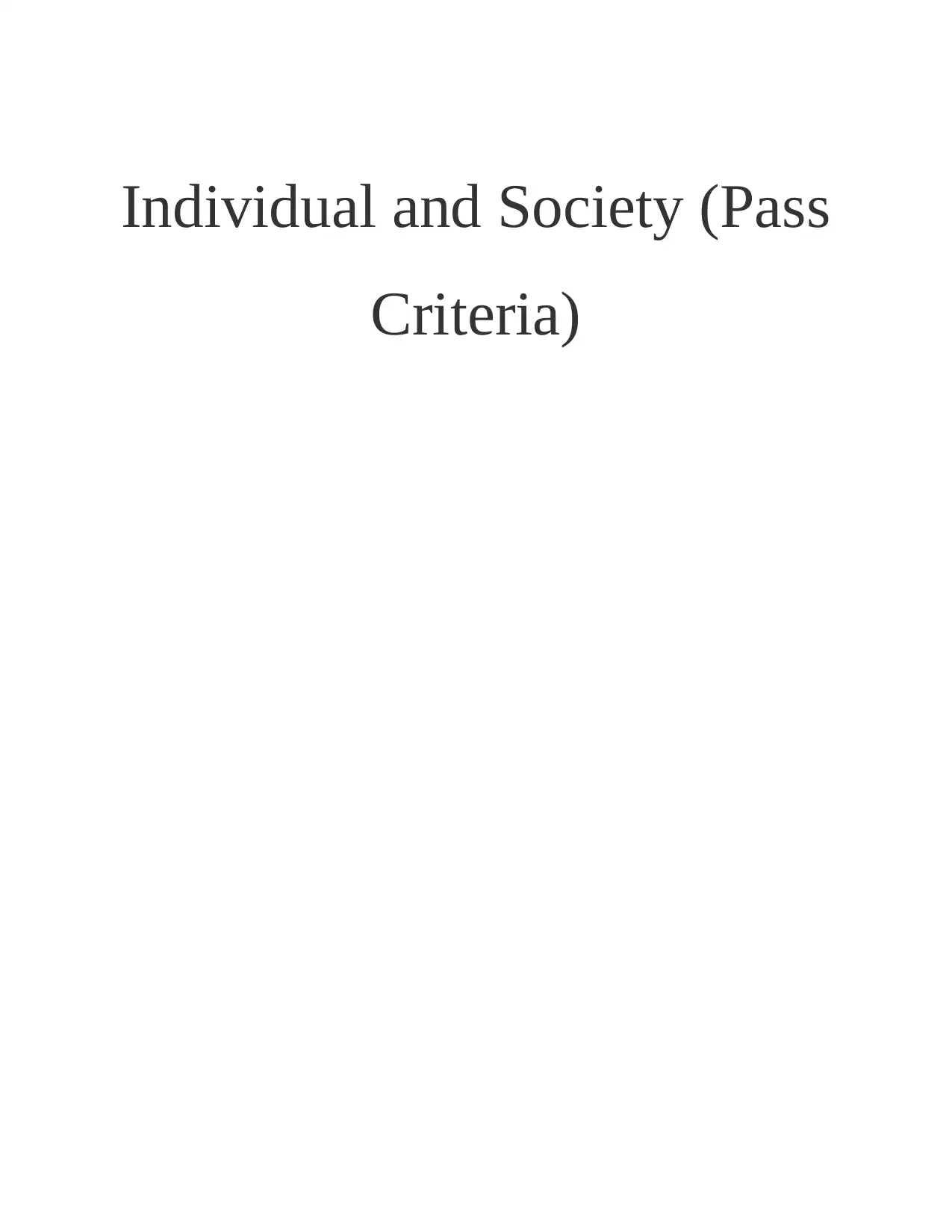
Individual and Society (Pass
Criteria)
Criteria)
Paraphrase This Document
Need a fresh take? Get an instant paraphrase of this document with our AI Paraphraser
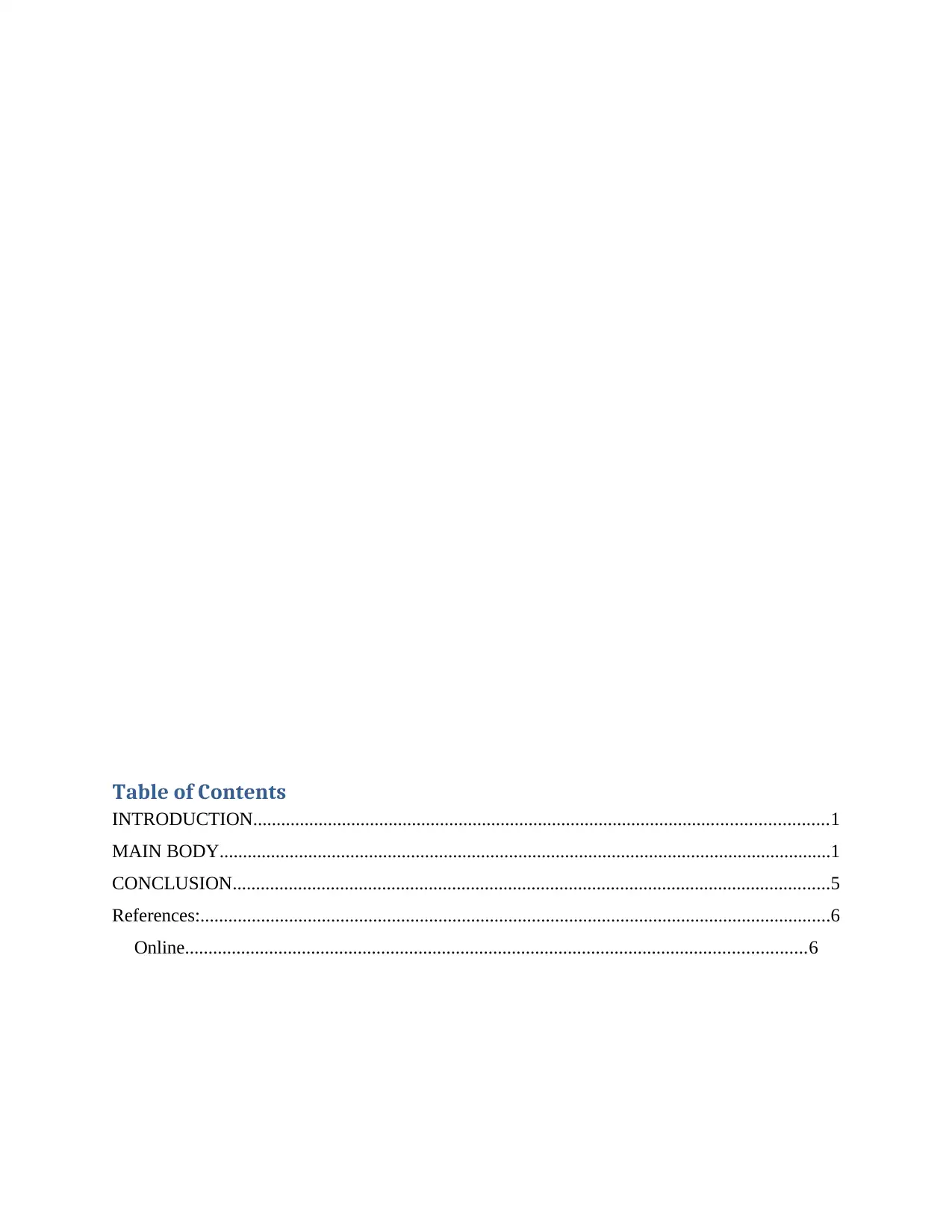
Table of Contents
INTRODUCTION...........................................................................................................................1
MAIN BODY...................................................................................................................................1
CONCLUSION................................................................................................................................5
References:.......................................................................................................................................6
Online.....................................................................................................................................6
INTRODUCTION...........................................................................................................................1
MAIN BODY...................................................................................................................................1
CONCLUSION................................................................................................................................5
References:.......................................................................................................................................6
Online.....................................................................................................................................6
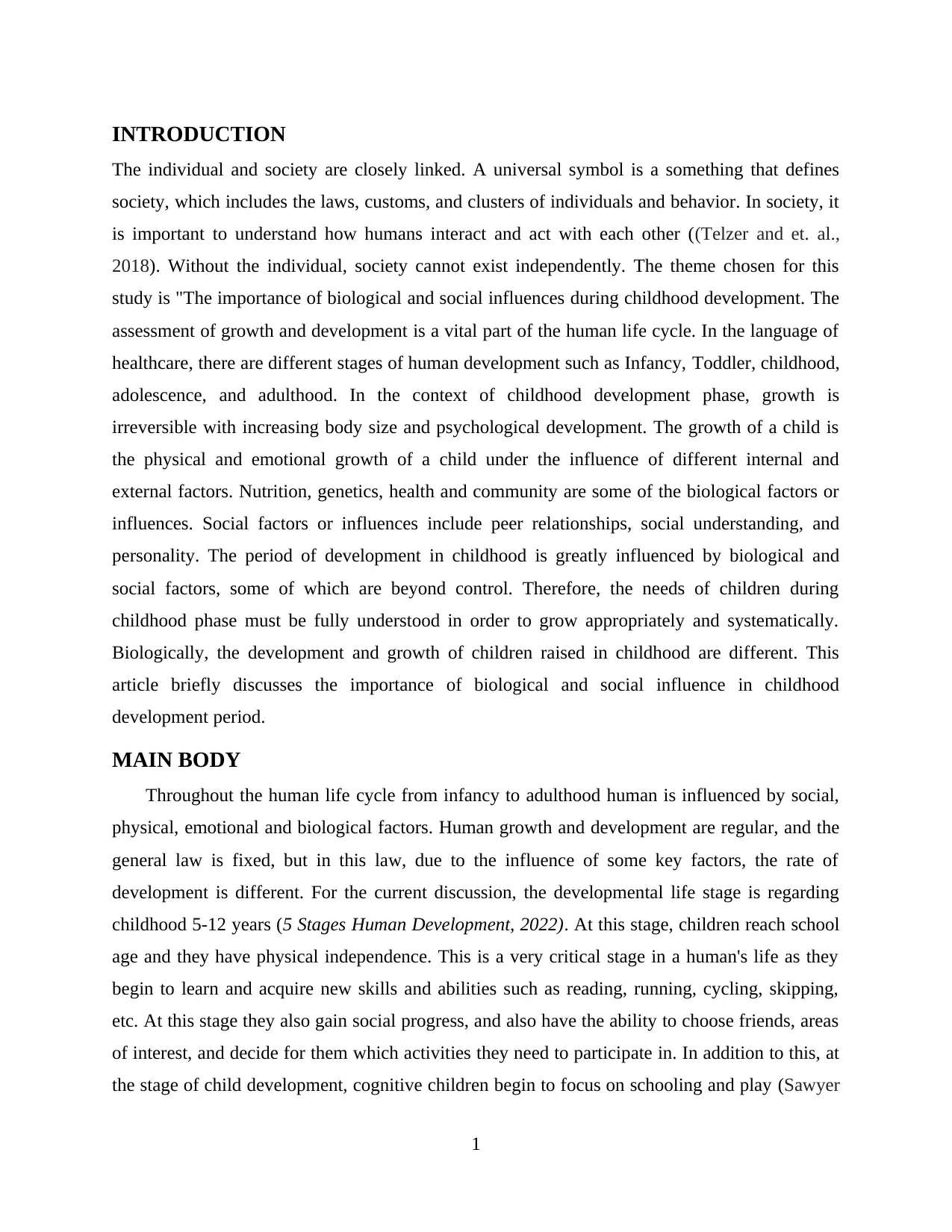
INTRODUCTION
The individual and society are closely linked. A universal symbol is a something that defines
society, which includes the laws, customs, and clusters of individuals and behavior. In society, it
is important to understand how humans interact and act with each other ((Telzer and et. al.,
2018). Without the individual, society cannot exist independently. The theme chosen for this
study is "The importance of biological and social influences during childhood development. The
assessment of growth and development is a vital part of the human life cycle. In the language of
healthcare, there are different stages of human development such as Infancy, Toddler, childhood,
adolescence, and adulthood. In the context of childhood development phase, growth is
irreversible with increasing body size and psychological development. The growth of a child is
the physical and emotional growth of a child under the influence of different internal and
external factors. Nutrition, genetics, health and community are some of the biological factors or
influences. Social factors or influences include peer relationships, social understanding, and
personality. The period of development in childhood is greatly influenced by biological and
social factors, some of which are beyond control. Therefore, the needs of children during
childhood phase must be fully understood in order to grow appropriately and systematically.
Biologically, the development and growth of children raised in childhood are different. This
article briefly discusses the importance of biological and social influence in childhood
development period.
MAIN BODY
Throughout the human life cycle from infancy to adulthood human is influenced by social,
physical, emotional and biological factors. Human growth and development are regular, and the
general law is fixed, but in this law, due to the influence of some key factors, the rate of
development is different. For the current discussion, the developmental life stage is regarding
childhood 5-12 years (5 Stages Human Development, 2022). At this stage, children reach school
age and they have physical independence. This is a very critical stage in a human's life as they
begin to learn and acquire new skills and abilities such as reading, running, cycling, skipping,
etc. At this stage they also gain social progress, and also have the ability to choose friends, areas
of interest, and decide for them which activities they need to participate in. In addition to this, at
the stage of child development, cognitive children begin to focus on schooling and play (Sawyer
1
The individual and society are closely linked. A universal symbol is a something that defines
society, which includes the laws, customs, and clusters of individuals and behavior. In society, it
is important to understand how humans interact and act with each other ((Telzer and et. al.,
2018). Without the individual, society cannot exist independently. The theme chosen for this
study is "The importance of biological and social influences during childhood development. The
assessment of growth and development is a vital part of the human life cycle. In the language of
healthcare, there are different stages of human development such as Infancy, Toddler, childhood,
adolescence, and adulthood. In the context of childhood development phase, growth is
irreversible with increasing body size and psychological development. The growth of a child is
the physical and emotional growth of a child under the influence of different internal and
external factors. Nutrition, genetics, health and community are some of the biological factors or
influences. Social factors or influences include peer relationships, social understanding, and
personality. The period of development in childhood is greatly influenced by biological and
social factors, some of which are beyond control. Therefore, the needs of children during
childhood phase must be fully understood in order to grow appropriately and systematically.
Biologically, the development and growth of children raised in childhood are different. This
article briefly discusses the importance of biological and social influence in childhood
development period.
MAIN BODY
Throughout the human life cycle from infancy to adulthood human is influenced by social,
physical, emotional and biological factors. Human growth and development are regular, and the
general law is fixed, but in this law, due to the influence of some key factors, the rate of
development is different. For the current discussion, the developmental life stage is regarding
childhood 5-12 years (5 Stages Human Development, 2022). At this stage, children reach school
age and they have physical independence. This is a very critical stage in a human's life as they
begin to learn and acquire new skills and abilities such as reading, running, cycling, skipping,
etc. At this stage they also gain social progress, and also have the ability to choose friends, areas
of interest, and decide for them which activities they need to participate in. In addition to this, at
the stage of child development, cognitive children begin to focus on schooling and play (Sawyer
1
⊘ This is a preview!⊘
Do you want full access?
Subscribe today to unlock all pages.

Trusted by 1+ million students worldwide
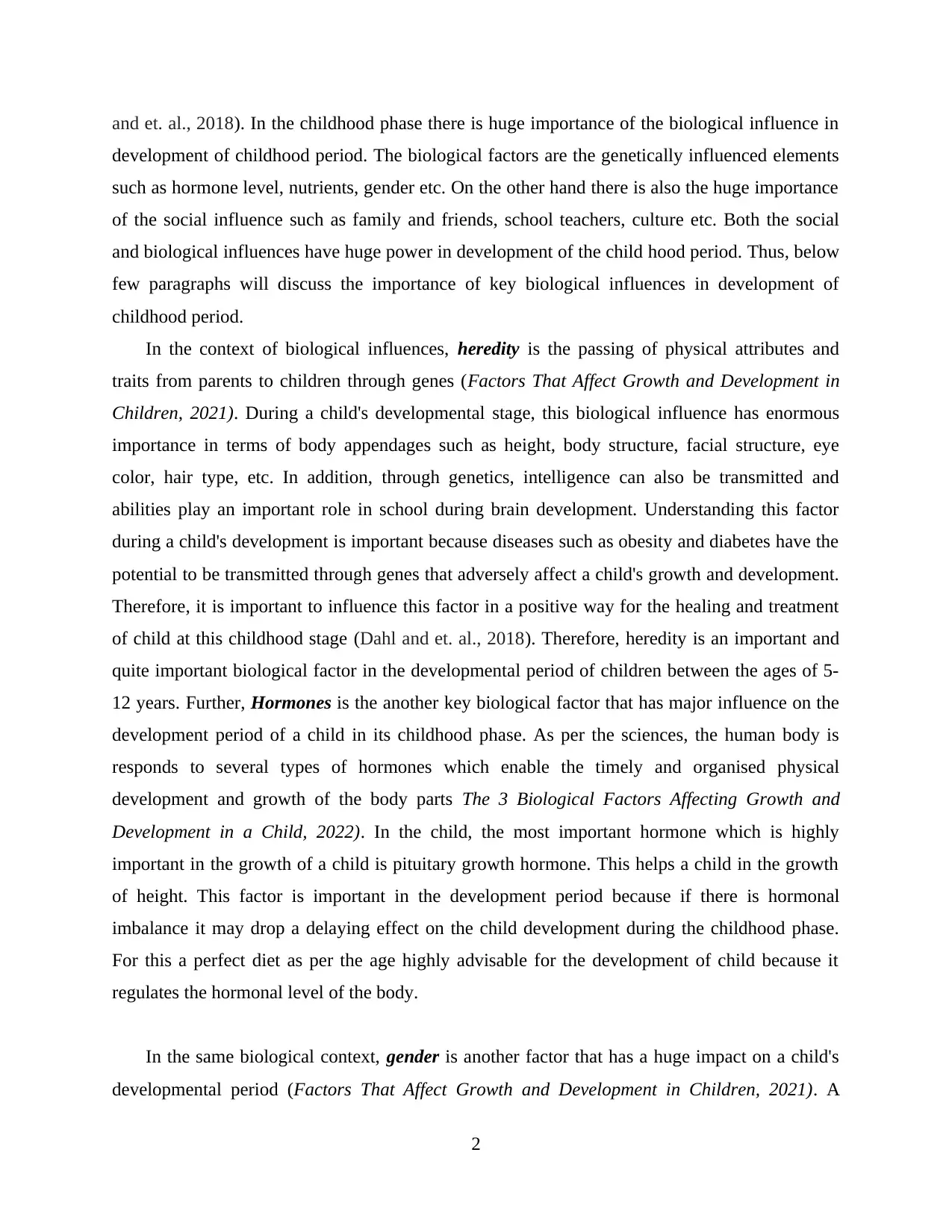
and et. al., 2018). In the childhood phase there is huge importance of the biological influence in
development of childhood period. The biological factors are the genetically influenced elements
such as hormone level, nutrients, gender etc. On the other hand there is also the huge importance
of the social influence such as family and friends, school teachers, culture etc. Both the social
and biological influences have huge power in development of the child hood period. Thus, below
few paragraphs will discuss the importance of key biological influences in development of
childhood period.
In the context of biological influences, heredity is the passing of physical attributes and
traits from parents to children through genes (Factors That Affect Growth and Development in
Children, 2021). During a child's developmental stage, this biological influence has enormous
importance in terms of body appendages such as height, body structure, facial structure, eye
color, hair type, etc. In addition, through genetics, intelligence can also be transmitted and
abilities play an important role in school during brain development. Understanding this factor
during a child's development is important because diseases such as obesity and diabetes have the
potential to be transmitted through genes that adversely affect a child's growth and development.
Therefore, it is important to influence this factor in a positive way for the healing and treatment
of child at this childhood stage (Dahl and et. al., 2018). Therefore, heredity is an important and
quite important biological factor in the developmental period of children between the ages of 5-
12 years. Further, Hormones is the another key biological factor that has major influence on the
development period of a child in its childhood phase. As per the sciences, the human body is
responds to several types of hormones which enable the timely and organised physical
development and growth of the body parts The 3 Biological Factors Affecting Growth and
Development in a Child, 2022). In the child, the most important hormone which is highly
important in the growth of a child is pituitary growth hormone. This helps a child in the growth
of height. This factor is important in the development period because if there is hormonal
imbalance it may drop a delaying effect on the child development during the childhood phase.
For this a perfect diet as per the age highly advisable for the development of child because it
regulates the hormonal level of the body.
In the same biological context, gender is another factor that has a huge impact on a child's
developmental period (Factors That Affect Growth and Development in Children, 2021). A
2
development of childhood period. The biological factors are the genetically influenced elements
such as hormone level, nutrients, gender etc. On the other hand there is also the huge importance
of the social influence such as family and friends, school teachers, culture etc. Both the social
and biological influences have huge power in development of the child hood period. Thus, below
few paragraphs will discuss the importance of key biological influences in development of
childhood period.
In the context of biological influences, heredity is the passing of physical attributes and
traits from parents to children through genes (Factors That Affect Growth and Development in
Children, 2021). During a child's developmental stage, this biological influence has enormous
importance in terms of body appendages such as height, body structure, facial structure, eye
color, hair type, etc. In addition, through genetics, intelligence can also be transmitted and
abilities play an important role in school during brain development. Understanding this factor
during a child's development is important because diseases such as obesity and diabetes have the
potential to be transmitted through genes that adversely affect a child's growth and development.
Therefore, it is important to influence this factor in a positive way for the healing and treatment
of child at this childhood stage (Dahl and et. al., 2018). Therefore, heredity is an important and
quite important biological factor in the developmental period of children between the ages of 5-
12 years. Further, Hormones is the another key biological factor that has major influence on the
development period of a child in its childhood phase. As per the sciences, the human body is
responds to several types of hormones which enable the timely and organised physical
development and growth of the body parts The 3 Biological Factors Affecting Growth and
Development in a Child, 2022). In the child, the most important hormone which is highly
important in the growth of a child is pituitary growth hormone. This helps a child in the growth
of height. This factor is important in the development period because if there is hormonal
imbalance it may drop a delaying effect on the child development during the childhood phase.
For this a perfect diet as per the age highly advisable for the development of child because it
regulates the hormonal level of the body.
In the same biological context, gender is another factor that has a huge impact on a child's
developmental period (Factors That Affect Growth and Development in Children, 2021). A
2
Paraphrase This Document
Need a fresh take? Get an instant paraphrase of this document with our AI Paraphraser
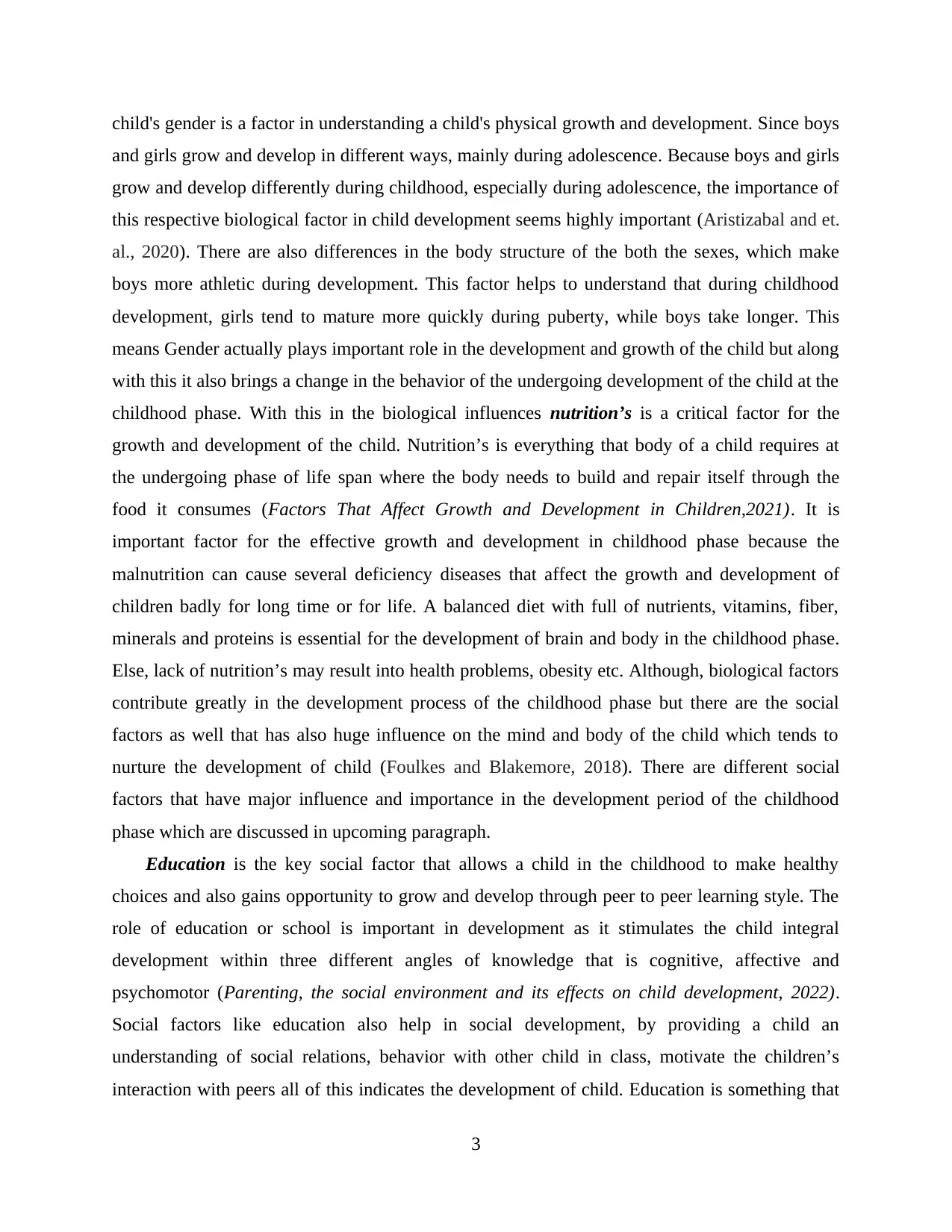
child's gender is a factor in understanding a child's physical growth and development. Since boys
and girls grow and develop in different ways, mainly during adolescence. Because boys and girls
grow and develop differently during childhood, especially during adolescence, the importance of
this respective biological factor in child development seems highly important (Aristizabal and et.
al., 2020). There are also differences in the body structure of the both the sexes, which make
boys more athletic during development. This factor helps to understand that during childhood
development, girls tend to mature more quickly during puberty, while boys take longer. This
means Gender actually plays important role in the development and growth of the child but along
with this it also brings a change in the behavior of the undergoing development of the child at the
childhood phase. With this in the biological influences nutrition’s is a critical factor for the
growth and development of the child. Nutrition’s is everything that body of a child requires at
the undergoing phase of life span where the body needs to build and repair itself through the
food it consumes (Factors That Affect Growth and Development in Children,2021). It is
important factor for the effective growth and development in childhood phase because the
malnutrition can cause several deficiency diseases that affect the growth and development of
children badly for long time or for life. A balanced diet with full of nutrients, vitamins, fiber,
minerals and proteins is essential for the development of brain and body in the childhood phase.
Else, lack of nutrition’s may result into health problems, obesity etc. Although, biological factors
contribute greatly in the development process of the childhood phase but there are the social
factors as well that has also huge influence on the mind and body of the child which tends to
nurture the development of child (Foulkes and Blakemore, 2018). There are different social
factors that have major influence and importance in the development period of the childhood
phase which are discussed in upcoming paragraph.
Education is the key social factor that allows a child in the childhood to make healthy
choices and also gains opportunity to grow and develop through peer to peer learning style. The
role of education or school is important in development as it stimulates the child integral
development within three different angles of knowledge that is cognitive, affective and
psychomotor (Parenting, the social environment and its effects on child development, 2022).
Social factors like education also help in social development, by providing a child an
understanding of social relations, behavior with other child in class, motivate the children’s
interaction with peers all of this indicates the development of child. Education is something that
3
and girls grow and develop in different ways, mainly during adolescence. Because boys and girls
grow and develop differently during childhood, especially during adolescence, the importance of
this respective biological factor in child development seems highly important (Aristizabal and et.
al., 2020). There are also differences in the body structure of the both the sexes, which make
boys more athletic during development. This factor helps to understand that during childhood
development, girls tend to mature more quickly during puberty, while boys take longer. This
means Gender actually plays important role in the development and growth of the child but along
with this it also brings a change in the behavior of the undergoing development of the child at the
childhood phase. With this in the biological influences nutrition’s is a critical factor for the
growth and development of the child. Nutrition’s is everything that body of a child requires at
the undergoing phase of life span where the body needs to build and repair itself through the
food it consumes (Factors That Affect Growth and Development in Children,2021). It is
important factor for the effective growth and development in childhood phase because the
malnutrition can cause several deficiency diseases that affect the growth and development of
children badly for long time or for life. A balanced diet with full of nutrients, vitamins, fiber,
minerals and proteins is essential for the development of brain and body in the childhood phase.
Else, lack of nutrition’s may result into health problems, obesity etc. Although, biological factors
contribute greatly in the development process of the childhood phase but there are the social
factors as well that has also huge influence on the mind and body of the child which tends to
nurture the development of child (Foulkes and Blakemore, 2018). There are different social
factors that have major influence and importance in the development period of the childhood
phase which are discussed in upcoming paragraph.
Education is the key social factor that allows a child in the childhood to make healthy
choices and also gains opportunity to grow and develop through peer to peer learning style. The
role of education or school is important in development as it stimulates the child integral
development within three different angles of knowledge that is cognitive, affective and
psychomotor (Parenting, the social environment and its effects on child development, 2022).
Social factors like education also help in social development, by providing a child an
understanding of social relations, behavior with other child in class, motivate the children’s
interaction with peers all of this indicates the development of child. Education is something that
3
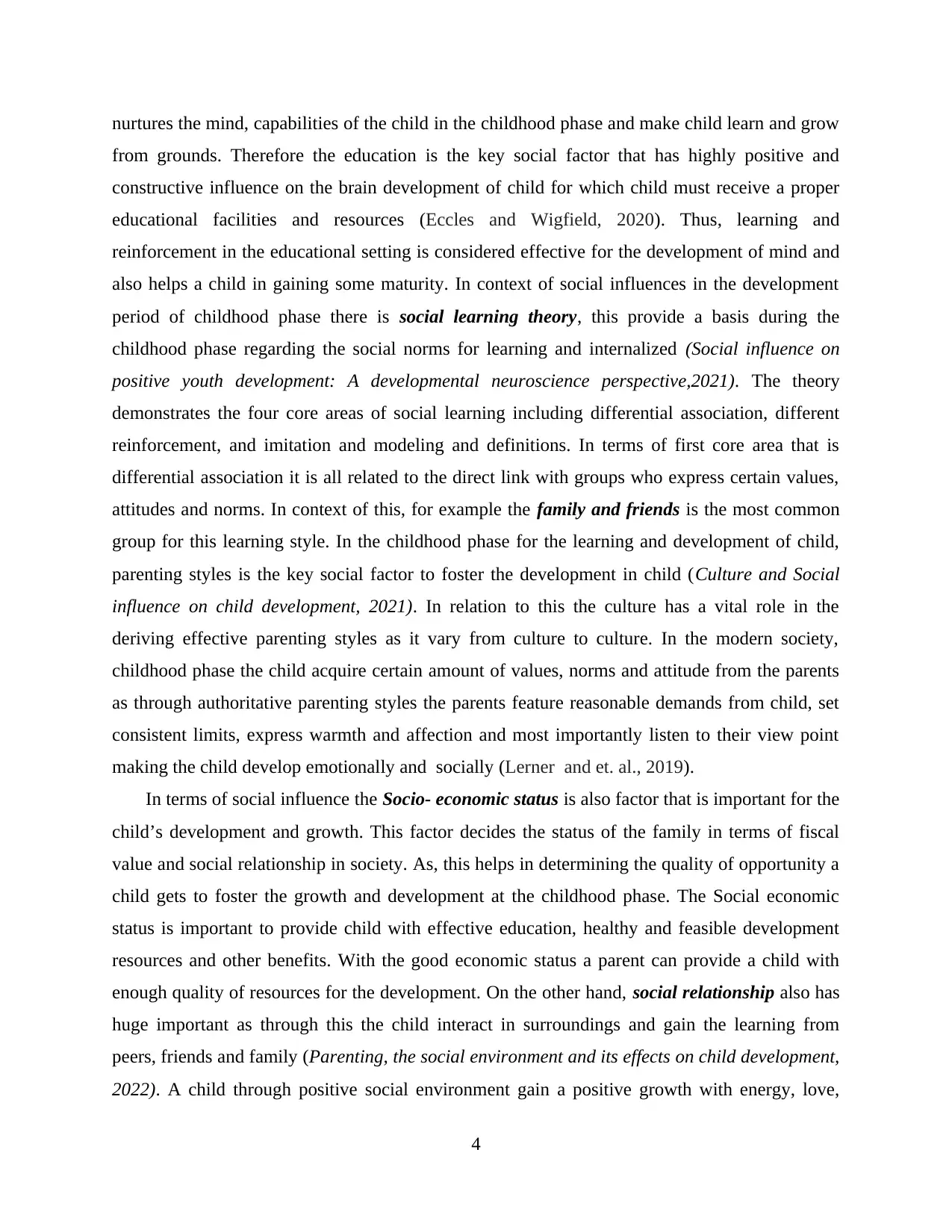
nurtures the mind, capabilities of the child in the childhood phase and make child learn and grow
from grounds. Therefore the education is the key social factor that has highly positive and
constructive influence on the brain development of child for which child must receive a proper
educational facilities and resources (Eccles and Wigfield, 2020). Thus, learning and
reinforcement in the educational setting is considered effective for the development of mind and
also helps a child in gaining some maturity. In context of social influences in the development
period of childhood phase there is social learning theory, this provide a basis during the
childhood phase regarding the social norms for learning and internalized (Social influence on
positive youth development: A developmental neuroscience perspective,2021). The theory
demonstrates the four core areas of social learning including differential association, different
reinforcement, and imitation and modeling and definitions. In terms of first core area that is
differential association it is all related to the direct link with groups who express certain values,
attitudes and norms. In context of this, for example the family and friends is the most common
group for this learning style. In the childhood phase for the learning and development of child,
parenting styles is the key social factor to foster the development in child (Culture and Social
influence on child development, 2021). In relation to this the culture has a vital role in the
deriving effective parenting styles as it vary from culture to culture. In the modern society,
childhood phase the child acquire certain amount of values, norms and attitude from the parents
as through authoritative parenting styles the parents feature reasonable demands from child, set
consistent limits, express warmth and affection and most importantly listen to their view point
making the child develop emotionally and socially (Lerner and et. al., 2019).
In terms of social influence the Socio- economic status is also factor that is important for the
child’s development and growth. This factor decides the status of the family in terms of fiscal
value and social relationship in society. As, this helps in determining the quality of opportunity a
child gets to foster the growth and development at the childhood phase. The Social economic
status is important to provide child with effective education, healthy and feasible development
resources and other benefits. With the good economic status a parent can provide a child with
enough quality of resources for the development. On the other hand, social relationship also has
huge important as through this the child interact in surroundings and gain the learning from
peers, friends and family (Parenting, the social environment and its effects on child development,
2022). A child through positive social environment gain a positive growth with energy, love,
4
from grounds. Therefore the education is the key social factor that has highly positive and
constructive influence on the brain development of child for which child must receive a proper
educational facilities and resources (Eccles and Wigfield, 2020). Thus, learning and
reinforcement in the educational setting is considered effective for the development of mind and
also helps a child in gaining some maturity. In context of social influences in the development
period of childhood phase there is social learning theory, this provide a basis during the
childhood phase regarding the social norms for learning and internalized (Social influence on
positive youth development: A developmental neuroscience perspective,2021). The theory
demonstrates the four core areas of social learning including differential association, different
reinforcement, and imitation and modeling and definitions. In terms of first core area that is
differential association it is all related to the direct link with groups who express certain values,
attitudes and norms. In context of this, for example the family and friends is the most common
group for this learning style. In the childhood phase for the learning and development of child,
parenting styles is the key social factor to foster the development in child (Culture and Social
influence on child development, 2021). In relation to this the culture has a vital role in the
deriving effective parenting styles as it vary from culture to culture. In the modern society,
childhood phase the child acquire certain amount of values, norms and attitude from the parents
as through authoritative parenting styles the parents feature reasonable demands from child, set
consistent limits, express warmth and affection and most importantly listen to their view point
making the child develop emotionally and socially (Lerner and et. al., 2019).
In terms of social influence the Socio- economic status is also factor that is important for the
child’s development and growth. This factor decides the status of the family in terms of fiscal
value and social relationship in society. As, this helps in determining the quality of opportunity a
child gets to foster the growth and development at the childhood phase. The Social economic
status is important to provide child with effective education, healthy and feasible development
resources and other benefits. With the good economic status a parent can provide a child with
enough quality of resources for the development. On the other hand, social relationship also has
huge important as through this the child interact in surroundings and gain the learning from
peers, friends and family (Parenting, the social environment and its effects on child development,
2022). A child through positive social environment gain a positive growth with energy, love,
4
⊘ This is a preview!⊘
Do you want full access?
Subscribe today to unlock all pages.

Trusted by 1+ million students worldwide
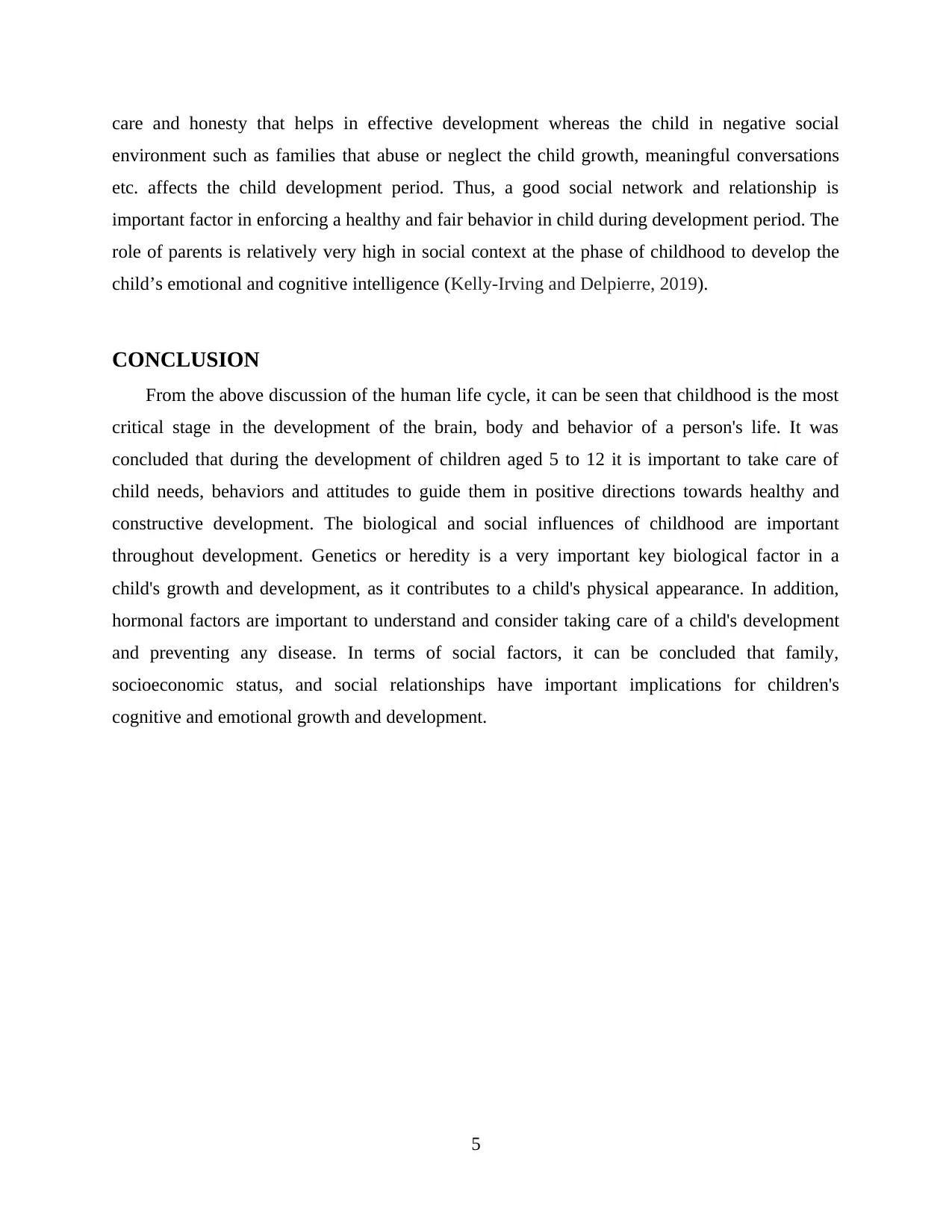
care and honesty that helps in effective development whereas the child in negative social
environment such as families that abuse or neglect the child growth, meaningful conversations
etc. affects the child development period. Thus, a good social network and relationship is
important factor in enforcing a healthy and fair behavior in child during development period. The
role of parents is relatively very high in social context at the phase of childhood to develop the
child’s emotional and cognitive intelligence (Kelly-Irving and Delpierre, 2019).
CONCLUSION
From the above discussion of the human life cycle, it can be seen that childhood is the most
critical stage in the development of the brain, body and behavior of a person's life. It was
concluded that during the development of children aged 5 to 12 it is important to take care of
child needs, behaviors and attitudes to guide them in positive directions towards healthy and
constructive development. The biological and social influences of childhood are important
throughout development. Genetics or heredity is a very important key biological factor in a
child's growth and development, as it contributes to a child's physical appearance. In addition,
hormonal factors are important to understand and consider taking care of a child's development
and preventing any disease. In terms of social factors, it can be concluded that family,
socioeconomic status, and social relationships have important implications for children's
cognitive and emotional growth and development.
5
environment such as families that abuse or neglect the child growth, meaningful conversations
etc. affects the child development period. Thus, a good social network and relationship is
important factor in enforcing a healthy and fair behavior in child during development period. The
role of parents is relatively very high in social context at the phase of childhood to develop the
child’s emotional and cognitive intelligence (Kelly-Irving and Delpierre, 2019).
CONCLUSION
From the above discussion of the human life cycle, it can be seen that childhood is the most
critical stage in the development of the brain, body and behavior of a person's life. It was
concluded that during the development of children aged 5 to 12 it is important to take care of
child needs, behaviors and attitudes to guide them in positive directions towards healthy and
constructive development. The biological and social influences of childhood are important
throughout development. Genetics or heredity is a very important key biological factor in a
child's growth and development, as it contributes to a child's physical appearance. In addition,
hormonal factors are important to understand and consider taking care of a child's development
and preventing any disease. In terms of social factors, it can be concluded that family,
socioeconomic status, and social relationships have important implications for children's
cognitive and emotional growth and development.
5
Paraphrase This Document
Need a fresh take? Get an instant paraphrase of this document with our AI Paraphraser
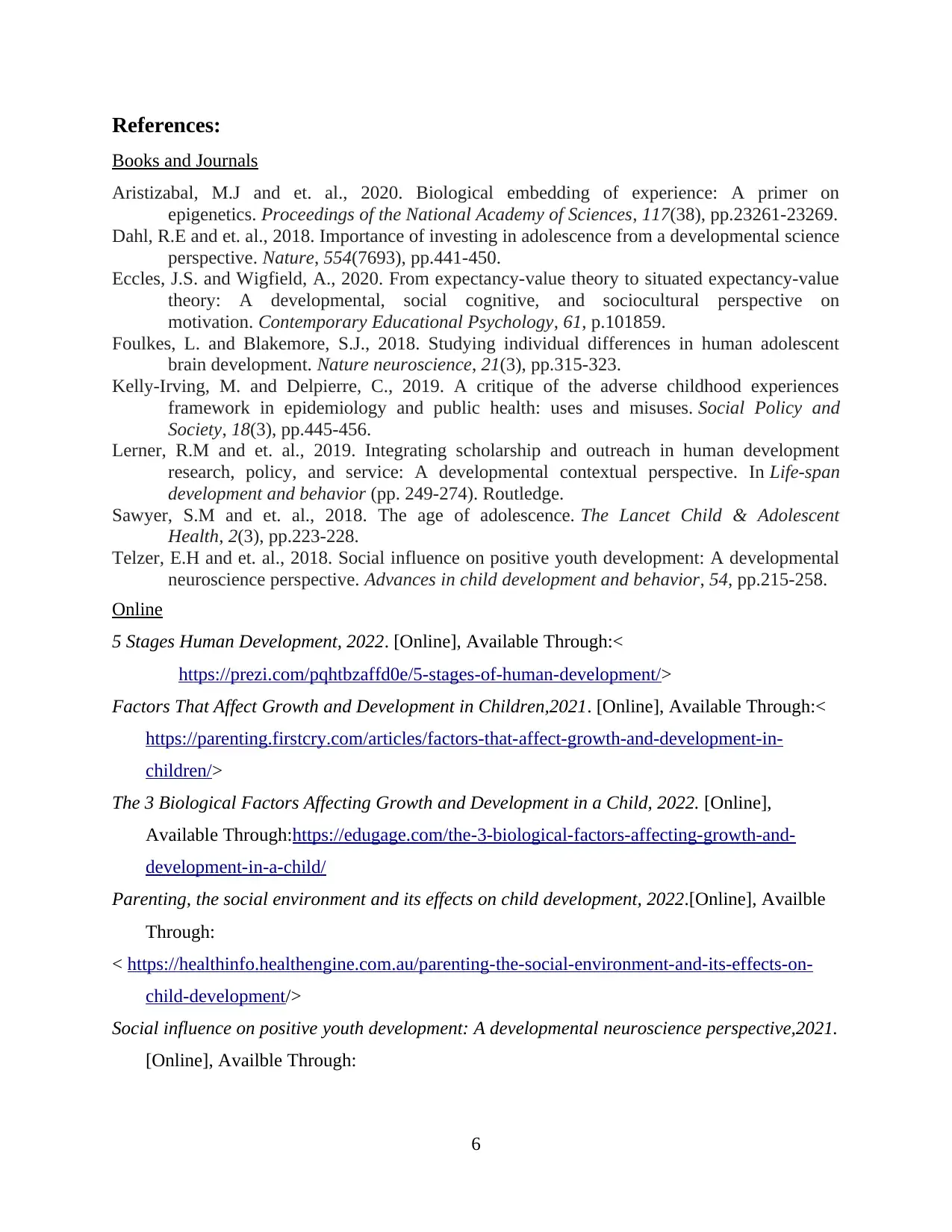
References:
Books and Journals
Aristizabal, M.J and et. al., 2020. Biological embedding of experience: A primer on
epigenetics. Proceedings of the National Academy of Sciences, 117(38), pp.23261-23269.
Dahl, R.E and et. al., 2018. Importance of investing in adolescence from a developmental science
perspective. Nature, 554(7693), pp.441-450.
Eccles, J.S. and Wigfield, A., 2020. From expectancy-value theory to situated expectancy-value
theory: A developmental, social cognitive, and sociocultural perspective on
motivation. Contemporary Educational Psychology, 61, p.101859.
Foulkes, L. and Blakemore, S.J., 2018. Studying individual differences in human adolescent
brain development. Nature neuroscience, 21(3), pp.315-323.
Kelly-Irving, M. and Delpierre, C., 2019. A critique of the adverse childhood experiences
framework in epidemiology and public health: uses and misuses. Social Policy and
Society, 18(3), pp.445-456.
Lerner, R.M and et. al., 2019. Integrating scholarship and outreach in human development
research, policy, and service: A developmental contextual perspective. In Life-span
development and behavior (pp. 249-274). Routledge.
Sawyer, S.M and et. al., 2018. The age of adolescence. The Lancet Child & Adolescent
Health, 2(3), pp.223-228.
Telzer, E.H and et. al., 2018. Social influence on positive youth development: A developmental
neuroscience perspective. Advances in child development and behavior, 54, pp.215-258.
Online
5 Stages Human Development, 2022. [Online], Available Through:<
https://prezi.com/pqhtbzaffd0e/5-stages-of-human-development/>
Factors That Affect Growth and Development in Children,2021. [Online], Available Through:<
https://parenting.firstcry.com/articles/factors-that-affect-growth-and-development-in-
children/>
The 3 Biological Factors Affecting Growth and Development in a Child, 2022. [Online],
Available Through:https://edugage.com/the-3-biological-factors-affecting-growth-and-
development-in-a-child/
Parenting, the social environment and its effects on child development, 2022.[Online], Availble
Through:
< https://healthinfo.healthengine.com.au/parenting-the-social-environment-and-its-effects-on-
child-development/>
Social influence on positive youth development: A developmental neuroscience perspective,2021.
[Online], Availble Through:
6
Books and Journals
Aristizabal, M.J and et. al., 2020. Biological embedding of experience: A primer on
epigenetics. Proceedings of the National Academy of Sciences, 117(38), pp.23261-23269.
Dahl, R.E and et. al., 2018. Importance of investing in adolescence from a developmental science
perspective. Nature, 554(7693), pp.441-450.
Eccles, J.S. and Wigfield, A., 2020. From expectancy-value theory to situated expectancy-value
theory: A developmental, social cognitive, and sociocultural perspective on
motivation. Contemporary Educational Psychology, 61, p.101859.
Foulkes, L. and Blakemore, S.J., 2018. Studying individual differences in human adolescent
brain development. Nature neuroscience, 21(3), pp.315-323.
Kelly-Irving, M. and Delpierre, C., 2019. A critique of the adverse childhood experiences
framework in epidemiology and public health: uses and misuses. Social Policy and
Society, 18(3), pp.445-456.
Lerner, R.M and et. al., 2019. Integrating scholarship and outreach in human development
research, policy, and service: A developmental contextual perspective. In Life-span
development and behavior (pp. 249-274). Routledge.
Sawyer, S.M and et. al., 2018. The age of adolescence. The Lancet Child & Adolescent
Health, 2(3), pp.223-228.
Telzer, E.H and et. al., 2018. Social influence on positive youth development: A developmental
neuroscience perspective. Advances in child development and behavior, 54, pp.215-258.
Online
5 Stages Human Development, 2022. [Online], Available Through:<
https://prezi.com/pqhtbzaffd0e/5-stages-of-human-development/>
Factors That Affect Growth and Development in Children,2021. [Online], Available Through:<
https://parenting.firstcry.com/articles/factors-that-affect-growth-and-development-in-
children/>
The 3 Biological Factors Affecting Growth and Development in a Child, 2022. [Online],
Available Through:https://edugage.com/the-3-biological-factors-affecting-growth-and-
development-in-a-child/
Parenting, the social environment and its effects on child development, 2022.[Online], Availble
Through:
< https://healthinfo.healthengine.com.au/parenting-the-social-environment-and-its-effects-on-
child-development/>
Social influence on positive youth development: A developmental neuroscience perspective,2021.
[Online], Availble Through:
6

<https://www.ncbi.nlm.nih.gov/pmc/articles/PMC6345387/#:~:text=Social%20influence
%20has%20an%20effect,the%20behaviors%20in%20future%20instances/.>
Culture and Social influence on child development, 2021. [Online, Available Through:<
https://www.thehansindia.com/life-style/culture-and-social-influence-on-child-development-
707069?infinitescroll=1/>
7
%20has%20an%20effect,the%20behaviors%20in%20future%20instances/.>
Culture and Social influence on child development, 2021. [Online, Available Through:<
https://www.thehansindia.com/life-style/culture-and-social-influence-on-child-development-
707069?infinitescroll=1/>
7
⊘ This is a preview!⊘
Do you want full access?
Subscribe today to unlock all pages.

Trusted by 1+ million students worldwide
1 out of 9
Related Documents
Your All-in-One AI-Powered Toolkit for Academic Success.
+13062052269
info@desklib.com
Available 24*7 on WhatsApp / Email
![[object Object]](/_next/static/media/star-bottom.7253800d.svg)
Unlock your academic potential
Copyright © 2020–2026 A2Z Services. All Rights Reserved. Developed and managed by ZUCOL.




